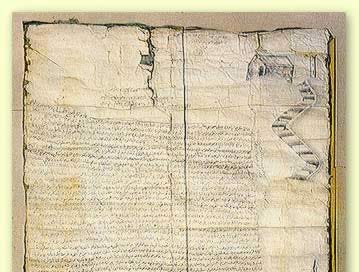A Letter of Love from Prophet Muhammad to Christians
A reminder of the power of interfaith harmony between adherents of the world's two largest religions
Across history, religion has often been used to divide—but it has also been a powerful force for unity, compassion, and justice. As a human rights lawyer, a person of faith, and an American Muslim, I’m deeply moved by the examples of interfaith solidarity that define the best of our shared human story. One of the most profound—and tragically overlooked—examples comes from the Prophet Muhammad (sa) himself, when he answered a question asked of him by his Christian neighbors.
A Letter of Love
In the 7th century, Christians of St. Catherine’s Monastery at Sinai wrote to Prophet Muhammad (sa) to inquire what their rights would be should they find themselves under Muslim rule? The below letter was the written response that he sent. The original letter, depicted above, is now in the Topkapi Museum in Istanbul, Turkey.1
This was in some ways a political treaty of peace and justice. But perhaps even more importantly, it was an authentic declaration of love, protection, and shared humanity. It is one of the earliest recorded affirmations of religious freedom and mutual respect between Muslims and Christians. A decisive statement of the need for secular governance, universal freedom of conscience, and absolute justice for all people, regardless of faith. At a time when xenophobia and religious hatred threaten to pull us further apart, this letter stands as a timeless reminder that our faiths do not make us enemies—they make us neighbors.
I hope this letter provides serves as a model for how we can interact with one another today. Here is The Ashtiname of Muhammad, presented to the Christian monks of Saint Catherine’s Monastery at Sinai:
This is a message from Muhammad ibn Abdullah, as a covenant to those who adopt Christianity, near and far, we are with them. Verily I, the servants, the helpers, and my followers defend them, because Christians are my citizens; and by Allah! I hold out against anything that displeases them.
No compulsion is to be on them. Neither are their judges to be removed from their jobs nor their monks from their monasteries.
No one is to destroy a house of their religion, to damage it, or to carry anything from it to the Muslims’ houses. Should anyone take any of these, he would spoil God’s covenant and disobey His Prophet. Verily, they are my allies and have my secure charter against all that they hate.
No one is to force them to travel or to oblige them to fight. The Muslims are to fight for them. If a female Christian is married to a Muslim, it is not to take place without her approval. She is not to be prevented from visiting her church to pray.
Their churches are to be respected. They are neither to be prevented from repairing them nor the sacredness of their covenants. No one of the nation (Muslims) is to disobey the covenant till the Last Day (end of the world).
At some point in the future, I will publish a more detailed legal analysis of this letter and all the detailed rights it guarantees. But for now I hope it conveys the clear message, that just as the Prophet Muhammad (sa) promised his protection and solidarity to Christians over 1,400 years ago, so too must we today renew that commitment to one another.
Closing Thoughts
Whether Muslim, Christian, Jewish, atheist, or otherwise—we are allies in the fight for justice, for human dignity, and for the right to worship, or not, in peace. In a world where religious minorities are persecuted, churches are defiled, mosques are bombed, and synagogues are targeted, this letter isn’t a relic of history—it’s a call to action. Let us protect one another’s sacred spaces, defend one another’s rights, and hold fast to the covenant of humanity.
As the Prophet Muhammad (sa) declared about his neighbors, “They are my allies and have my secure charter against all that they hate.” May we be worthy of that legacy.
English translation of letter reproduced from ‘Muslim History: 570 – 1950 C.E.’ by Dr. A. Zahoor and Dr. Z. Haq, ZMD Corporation. P.O. Box 8231 – Gaithersburg, MD 20898-8231 – Copyright Akram Zahoor 2000. P. 167





Thank you for this letter. Sometimes we can look to the past when we need a moral guide to our future. I think it's a wonderful model for how we can treat each other with respect and dignity, this is so needed now!
This is an interesting post and I'm glad I could read it! However, I am curious--why is there a (sa) after each mention Muhammad's name? I think it's a respect thing but I don't want to assume!